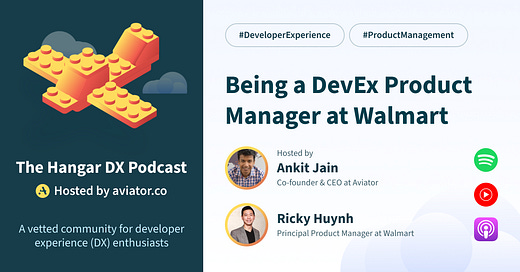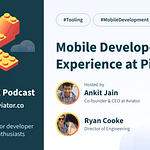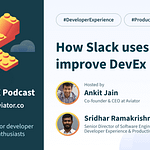About Ricky HuynhRicky Huynh is a Lead Product Manager at Walmart Global Tech with over 12 years of experience delivering AI-driven tools and developer platforms that have saved millions in operational costs and boosted productivity for tens of thousands of users. He holds a Master’s in Mechanical Engineering with a focus on Product Design, blending technical expertise with a passion for building intuitive, scalable solutions. A builder by nature, Ricky spends his free time on woodworking, home improvement, and automotive projects, and has recently picked up new hobbies like playing the piano and RV camping—always guided by the motto: “I’ll never know if I never try.”
Ricky on LinkedIn
Chapters
00:00 Being a PM In DX at Walmart
05:23 Technical Skills for a PM in Developer Experience
09:39 A Day in the Life of a PM in Developer Experience
12:13 Gathering Feedback from Developers
19:18 Driving Adoption of Developer Tools
24:57 Standardization vs. Flexibility in Developer Tools
31:25 Future Vision for Developer Experience
33:11 When to Consider Hiring a PM for Developer Experience
Being a DevEx Product Manager serving 20,000 developers
As a DevEx Product Manager, Ricky’s job is to make his users, about 20,000 developers, happier.
In this episode, Ankit and Ricky Huynh, a DevEx Product Manager at Walmart and the first Product Manager on the Hangar DX podcast, discuss the role of a DevEx Product Manager and how to become one, how to make developers use the products you build for them, the balance of standardization and innovation, and the future of developers and product managers.
Three areas of DevEx
1. Platform and Tools: the foundation of getting developers what they need to get their applications to production, like CI-CD pipelines, testing, runtime environments, databases, cloud services, etc.
2. Accelerators: These help developers move faster through their development lifecycle, such as starter kits, deployable blueprints, coding assistants, agentic AI, etc.
3. Documentation and Learning: Connecting developers to the tools and knowledge that they need to get going
And, a unified platform to stitch these three into a unified experience.
How technical does a Product Manager for DevEx have to be?
Ricky says the DevEx PM role is just like any other PM role. You are still the voice of a user. And yes, I call my users. You still need to build empathy, understand workflows, dig deep into their problems, talk to them regularly, and always serve them the best you can.
The level of tech skills also depends on which of the four areas of DevEx you are building. If you're a PM on the testing or databases side, those require more technical knowledge and even a developer who's converted to a PM.
If I’m hiring someone to collaborate with the leaders, change the culture, or create a community, that’s not a technical domain. It depends on the problem you’re trying to solve, but being technical helps. It helps with being a stronger PM, but depending on which areas you dive into, it's not necessary.
A Week in the Life of DevEx Product Manager
Ricky says it’s hard for him to describe a day in the life of a DevEx product manager, so he shares what his week looks like.
Every week, he checks with his engineering team. They evaluate the backlog, check if they have to reprioritize some of the work, and reestablish the goals. He meets with the UX design team to discuss current projects and plan for the next 6 or 12 months. Then, he has weekly meetings with the PMs on his team to get status updates.
Then it’s reading customer feedback, talking to customers, or meeting with them. My customers, again, are internal Walmart developers.
On a bi-weekly basis, I meet with our VPs or my skip level and share the latest top-of-mind problems we're considering.
I also spend time writing memos and refining strategy papers.
When to hire a DevEx Product Manager?
If your team has a leader who is extremely user-focused, can think about and take feedback well, and can act on user feedback and enjoys that aspect of the job, you may not need a product manager. Or, if you're just starting a company, you don't need one.
When you get to a scale where you want the developer leader to focus more on the technology side and less on looking at collecting and listening to developers’ feedback, that's when you should probably bring a DevEx product manager.
How to define success?
I judge my success by user sentiment. Another way to judge my success is whether my users are actually using the product we’ve built.
Sometimes, we build a product and it just doesn't catch on, and that’s a pretty strong signal that we were actually solving developers’ pain points.
How do you get adoption?
When I started this job and had to build the unified platform and solve the integration problem, I tried to get the buy-in very much like a startup within the company. I came up with a presentation deck, did a road show, and sold the vision of here's how we're going to help you.
With the teams that did not buy in, I tried to escalate and talk to their managers to get them to do so. That didn’t really work.
Then, I took the approach of, "Let's just keep adding more value to our platform. That’s going to drive more users."
I find this approach the most successful, focusing most of my attention on the product. Once you solve a problem and give developers value, they will use the product.
The future of developers
I think developers will become more like product managers in the future because they won’t have to focus on coding as much. They could leverage AI to do most of the coding and have time to think about the product problems.
What would you change about the developer experience if you had unlimited resources?
If I had unlimited resources to solve the developer experience problem at Walmart specifically, I would have a team that would dive into every stage of the development journey and focus on making it work like magic.
Takeaways
Developer Experience encompasses platform tools, accelerators, and documentation.
Walmart has about 25,000 monthly users in Global Tech, including developers and PMs.
Technical skills for a PM in DevEx depend on the specific area of focus.
Transitioning into a DevEx PM role requires understanding the problems to solve.
Feedback from developers is gathered through surveys and direct communication.
Prioritization involves balancing leadership requests with developer needs.
Success is defined by user sentiment and tool adoption rates.
Driving adoption of tools requires solving real developer problems.












Share this post